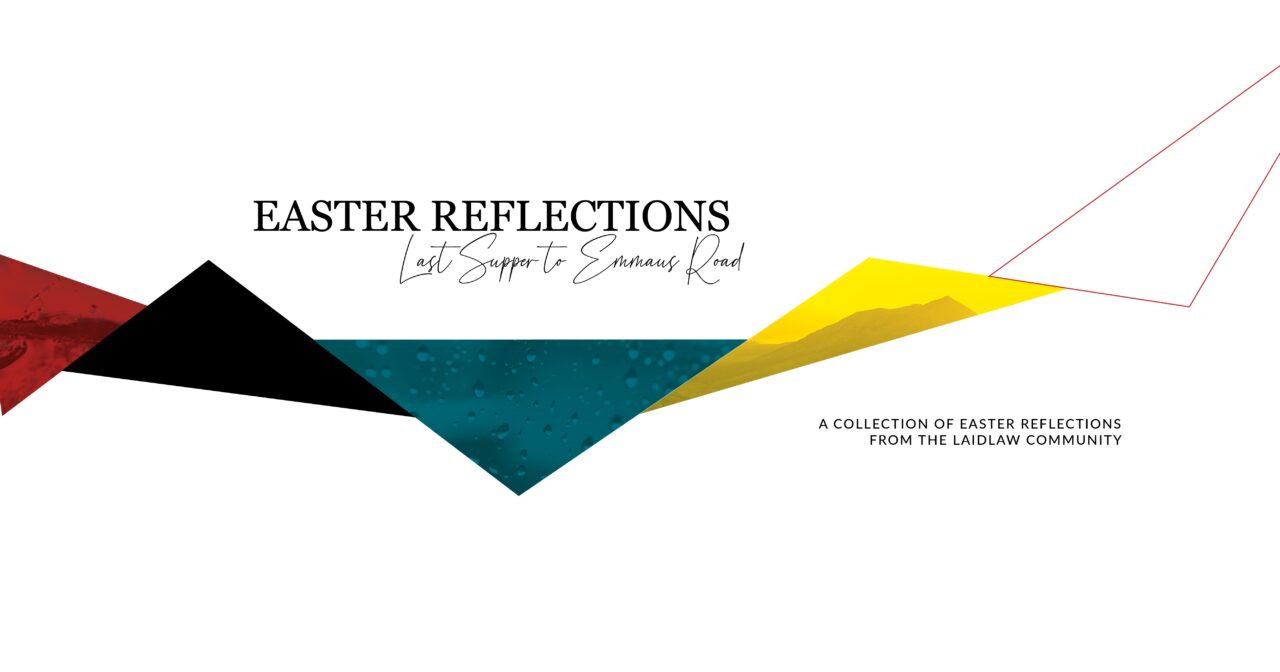Easter Reflections 2021
The rhythm of the Easter weekend is familiar to us, and that familiarity can cause us to rush ahead, when we should be savouring each day. Together the days of the Easter weekend represent a diverse range of human and divine experience—some are bitter and some are sweet, but each day offers to us an invitation to encounter God. Join us each day as we reflect through words and music.
May you find space this Easter to pause to reflect, to look for the Saviour in every season of life, and to be met by love.
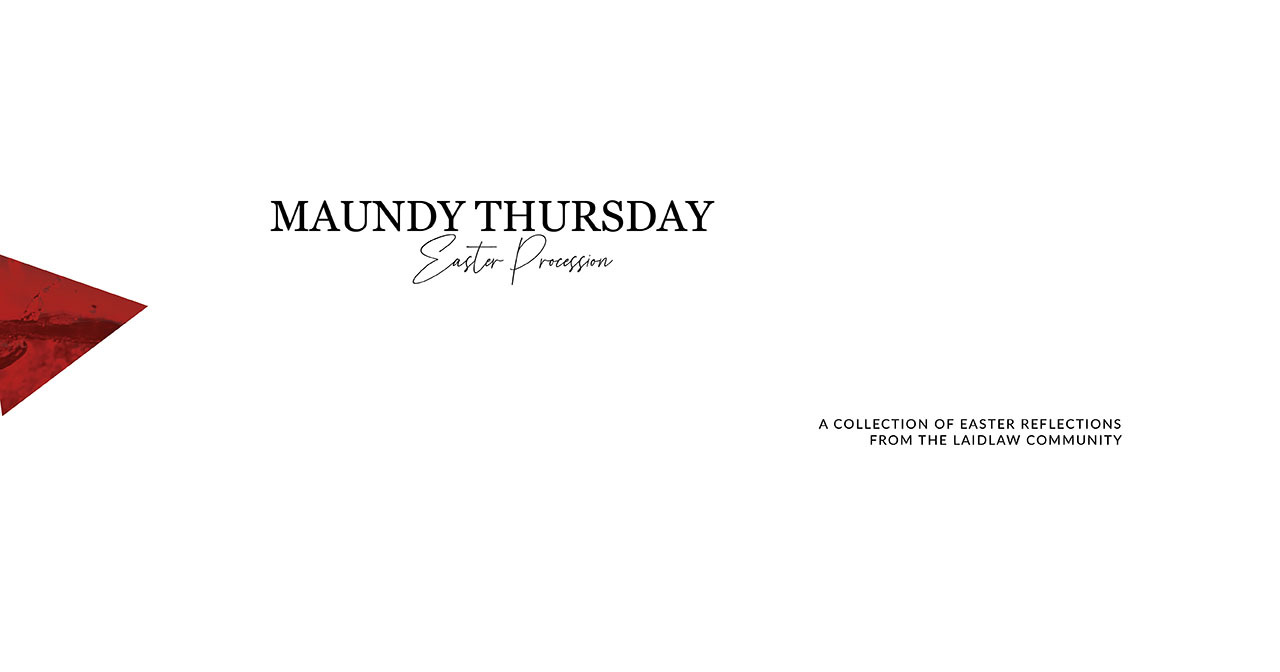
Generations upon generations into the family of faith, we are used to the rhythm of Easter: we know how the story goes and that resurrection happens on Sunday. We know the end from the beginning, but from the vantage point of Maundy Thursday we know we have to passage through Good Friday first.
We know that on Friday Christ takes up his cross and carries it on his journey to Golgotha. On the way, Simon of Cyrene is seized by the authorities and compelled to carry that cross, sharing the impossible load.
We, however, are invited to take up our cross and carry it on our journey of discipleship (Matt 16:24-27; Luke 9:23, 14:27). This is no easy thing. Some of us will—like the author of today’s poem, Sarah Penwarden—literally carry a cross through our communities’ streets in an act of remembrance. The process of participation, however it is expressed, is weighty. This is a burden we cannot carry lightly.
On Maundy Thursday there is a sense of hesitation as we look out over the Easter weekend. A reluctance to engage in this full range of human and divine experience.
These Easter reflections are your invitation to engage. To lean into the discomfort. And to find there the Saviour we have always been looking for, and who has always been looking for us, whatever season of life we find ourselves in.
Easter procession Titirangi
A cross on his shoulders; a file of people, walk behind with black umbrellas: les parapluies; the rain falls in fine drops: spider lines, while above our heads the mist cloaks trees in white cocoons; to walk in silence past columns of rata and rimu which burst into leaf in a praise of green; up ahead the church, and footfall on footfall, we tremble behind a wooden cross.
~ Sarah Penwarden First appeared in 2019 in Stimulus: The New Zealand Journal of Christian Thought and Practice, 26(1), 72.
Maja Whitaker, Lecturer in Practical Theology, School of Theology Dr Sarah Penwarden, Lecturer, School of Social Practice (Counselling)
FOR LISTENING
“Looking for a Savior” by United Pursuit (feat. Will Reagan)
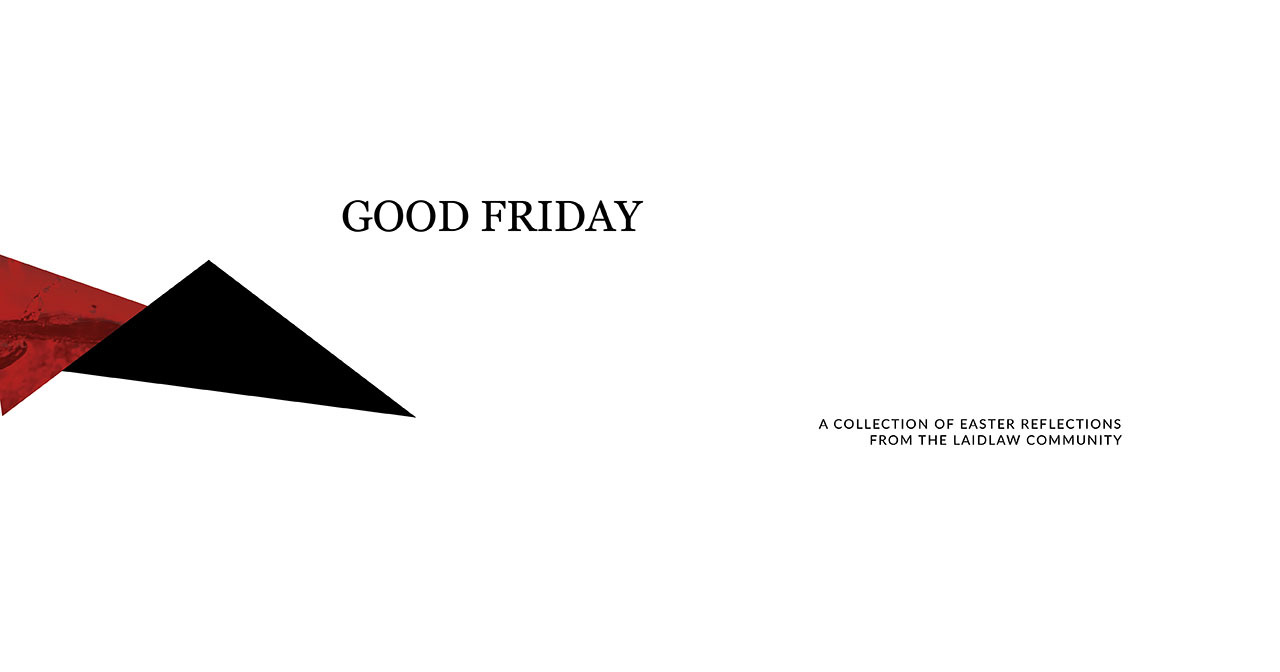
My God, My God, Why have you Forsaken me?
We lost our youngest son, Jonny, four years ago, when he was sixteen.
He died feeling unloved by, and abandoned by, God. God was completely silent and absent to Jonny throughout his illness.
So I have a deep appreciation of something that does not get talked about much in church – even though a large body of Scripture does talk about it – the open and honest witness to God’s silence and absence.
“My God, my God, why have you forsaken me?”
And yes – the core testimony of Scripture, and of the Easter Story, is that God is good, God is close, God cares. But the segments of Scripture that tell a different story are not mere fragments – they are portions. A not insignificant corpus of the Bible witnesses to God’s silence and absence, and sometimes cruelty (see Ps 44:9-19). We might capture this body of Scripture with the word “lament”.
Lament swells the pages of Habakkuk and Lamentations, and there are no less than sixty Psalms that witness to God’s abandonment. The Psalms are the song book of the Bible. Yet those songs are rarely echoed in our churches.
There are five laments scattered throughout the book of Jeremiah – known as the Confessions of Jeremiah - which also witness to God’s silence and absence.
We often hear Jeremiah 29:11 pronounced with gusto: – a verse many adult Christians could quote word for word: “For I know the plans I have for you, says the Lord, plans to prosper you and not to harm you.”
Easter Sunday echoes this verse.
But we rarely, if ever hear Jeremiah 15:18 read. “LORD God Almighty. You are to me like a deceptive brook, like a spring that fails.”
Easter Friday echoes that verse.
Here’s the thing, when I have spoken about God’s silence and absence over these last painful years, something unexpected has occurred. At least three quarters of the Christians who I speak to know exactly what I am talking about. And my word, do they welcome the opportunity to say so. It is like a huge elephant sits in the room that most people know is there but few have ever seen acknowledged: God is good, God is close, God is loving, yes… but not always. There is Sunday and there is Friday.
“My God, my God why have you forsaken me?”
Fuller Youth Institute make this bold statement, based on extensive research: “It’s not doubt that is toxic to faith; it’s silence.”[1] They found that while over 70 per cent of Christian young people had serious doubts about faith – only a quarter of those young people ever talked with anyone about it.
And throughout the West, the majority of Christian young people never become Christian grown-ups.
One reason why, I suggest, is that being Christian has meant not being real; they could no longer navigate the elephant in the room or the eggshells they had to tread to avoid acknowledging that sometimes, even often, God is quiet, doubt is real, and our Lord cannot be found.
“My God, my God, why have you forsaken me?”
A popular video, when I was a young Christian, was Tony Campolo’s ”It’s Friday but Sunday’s coming.” The basic tenor of the talk was: do not worry about Friday because – Sunday is coming! But many people dwell in Friday. Some are there for a long time. As I have been.
Let us not dismiss the reality of Friday this Easter. Let us weep with those who weep, and let their pain be acknowledged and expressed, for this too can be its own balm.
Let those who feel forsaken remain within the Easter story, and within the embrace of the people of God.
Let us welcome lament – for lament too is the cry of faith.
Phil Trotter, Professional Teaching Fellow, School of Theology
[1] “Why Doubt Needs to Have a Place in your Youth Ministry,” Brad Griffin, Aug 18 2016, Fuller Youth Institute, https://fulleryouthinstitute.org/blog/why-doubt
FOR LISTENING
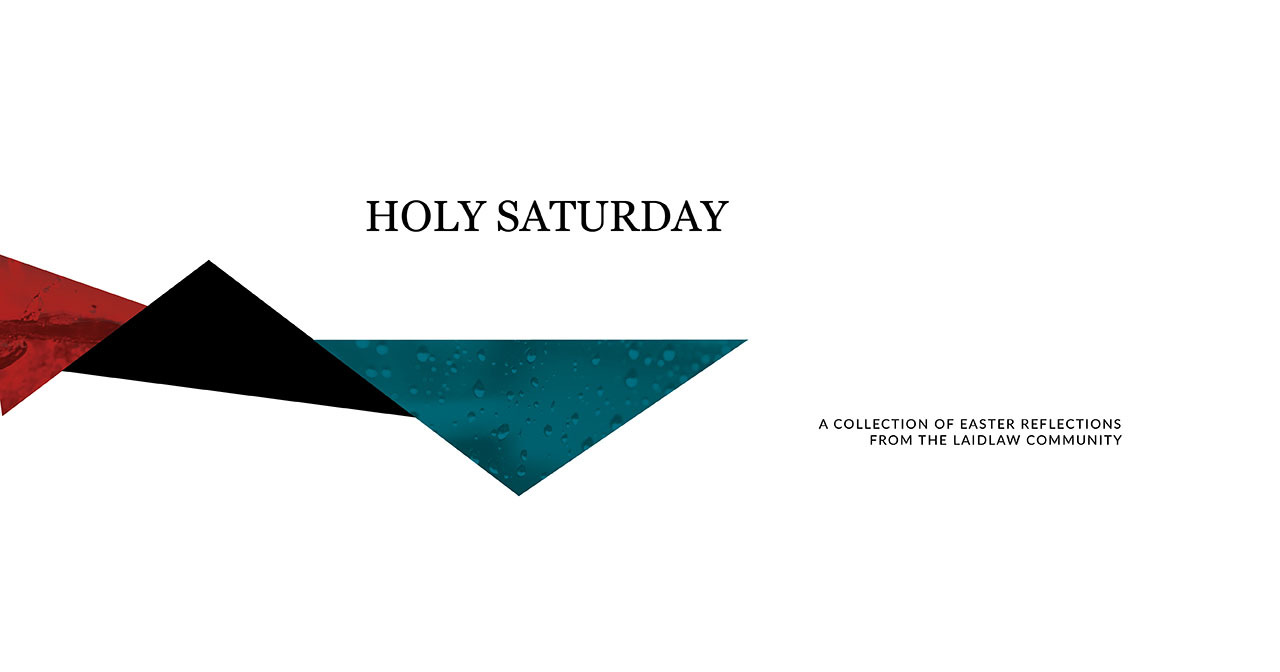
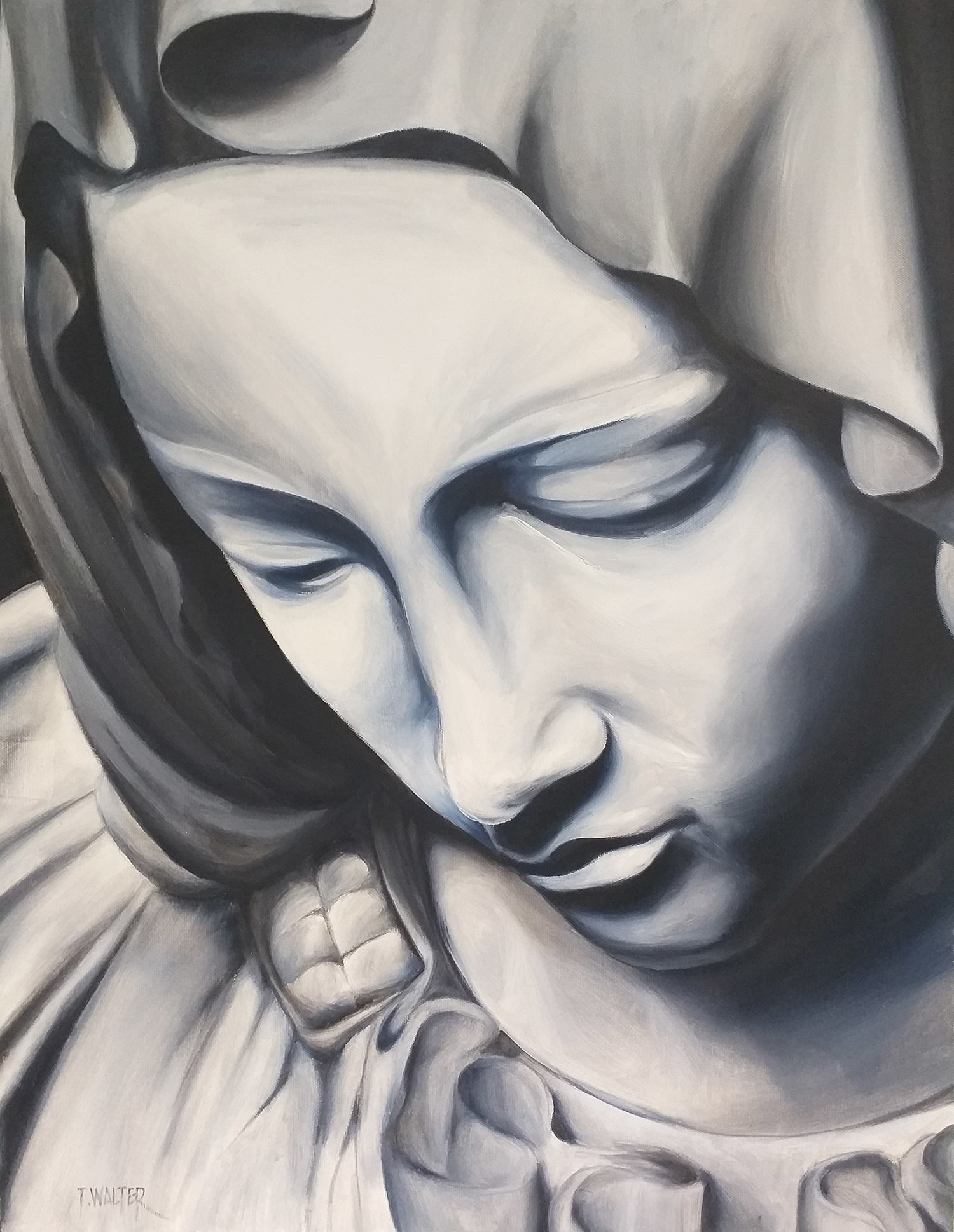
"Pieta" by Tony Walter
Holy Saturday reminds us of a world waiting for justice the barely-endurable vigil of sitting through the night without sleeping listening for the breath of another the gaping sorrow of empty arms when death claims one we love
Holy Saturday stands like a bookmark for the cold of poverty and isolation for the chasm of estrangement for words of condemnation, given and received
Holy Saturday is the prodigal in the pigpen the lowest ebb the memory of brutality ptsd child trafficking slave labour oppression of every kind waking up to space where a loved one once lay beside you
Holy Saturday is so deep a sorrow that it cannot bear the sorrow of another it is empty silence on the other side of weeping it is a raw imagining of the eternal one dead upon a stone slab in a borrowed tomb it is regret wishing you hadn’t run away it is reliving your denial it is reliving the words you can no longer take back rehearsing the words you wish you had said when you had the chance
Holy Saturday is a tomb Holy Saturday is a world that doesn’t know resurrection it is a terminal diagnosis science and medicine without answers it is the valley of the shadow of death and no rod or staff for comfort it is questioning the messiah you thought you knew
Holy Saturday holds us it waits in the darkness with doubt it offers no easy answers or trite clichés it enters in to ashes it stands at gravestones it smells like burial
it shows us the shiny falseness of the things we pursue the hollowness of riches and possessions the fickleness of the crowd clangs loudly, painfully our inability to cling to those we love
Holy Saturday is the mystery of a God who dies while the temple curtain tears and the earth shakes it is a faith that will not gloss over pain it is a God who knows the loss of a son it is the questions that are too hard to voice
Holy Saturday reminds us not to hurry those who grieve to be with them in the darkness it reminds us that creation groans and that we are not condemned for grief
Holy Saturday reminds us of Jesus grieving at the tomb of a friend though he held resurrection in his command Holy Saturday gives us the gift of being with questions with doubts with sorrow with trauma with misgiving
Holy Saturday is the stop in the dark we fear to take the darkness we try to escape with plastered-over easy alleluias it is the gift of one who does not hurry us through death but waits with us however long it takes for Sunday to come
Holy Saturday is a God who knows intimately the inside of death who has gone towards it without flinching
Miriam Fisher, Christchurch Coordinator and Lecturer, School of Social Practice (Education)
FOR LISTENING
“Daughters of Zion” by The Porter's Gate (feat. Josh Garrels & Casey J)
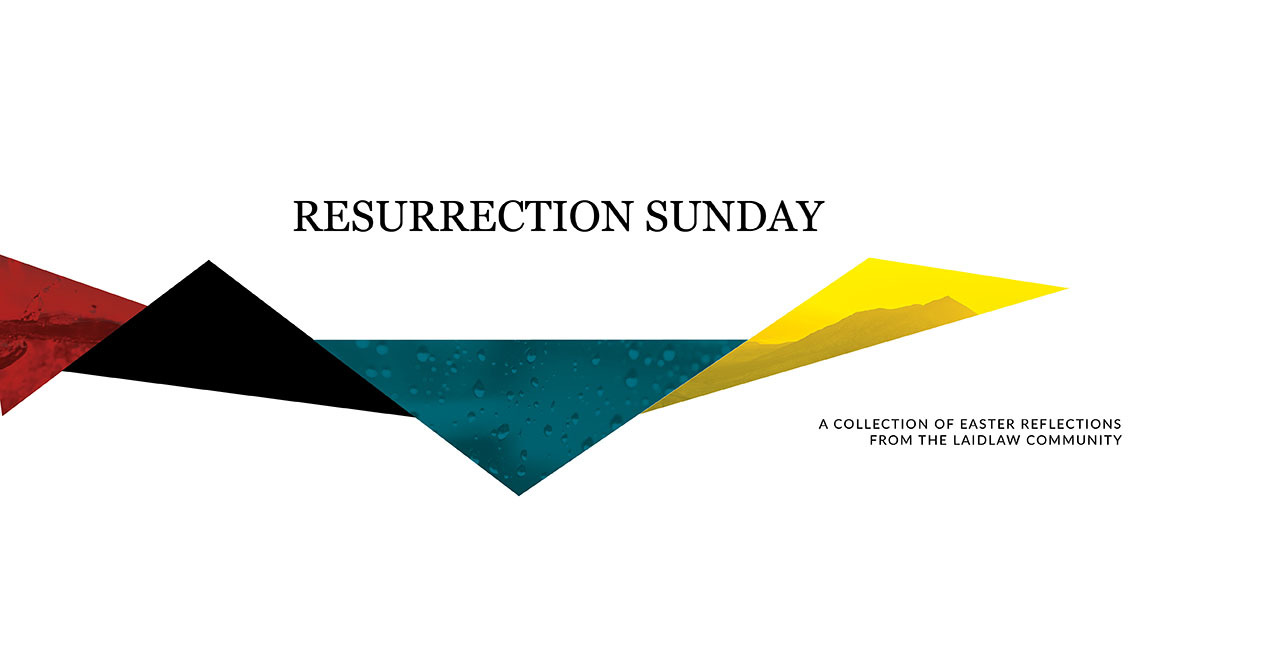
Resurrection came as a surprise.
We knew it was coming. We knew that however tragic the Easter story was, it would end with a “happily ever after” on Sunday. And so, the temptation for us is to fast-forward through Good Friday and Holy Saturday, to leap straight on to Resurrection Sunday—bring on the triumph and the praise (and the chocolate).
But however much we might like to fast-forward to Resurrection Sunday, the realities of life teach us that that’s an impossibility.
More than this though, we cannot skip over the brokenness, for the final resolution does not negate what went on before. Even the happiest of “happily ever after”s still carries with it the story that went before: the drama, the tension, and the hope that was lost before it was restored. This truth is marked clearly on the body of our triumphant Saviour: Jesus’ resurrection body is glorious, but it’s still wounded. It is the mark of the nails that he offers the disciples to prove that their “happily ever after” has come: he has defeated death and been raised to life again (John 20:19-29).
They had not been expecting this.
It is in to the middle of this that we live. He has been resurrected, but we have not yet. He lives in fullness of life, but we do not yet. He has defeated sin, death and shame, but we have not yet.
Death speaks and it still has a say in our world. Sin speaks and it still has a say. Shame speaks and it still has a say.
We live with the consequences of this every day—the brokenness of creation and the brokenness of humanity. But they do not have the last word. Death, sin and shame do not define either our ultimate destiny or our ultimate identity.
When shame whispers its lies, we can proclaim that “through the death of Christ in his physical body… [God] has brought [us] into his own presence, and [we] are holy and blameless as [we] stand before him without a single fault” (Colossians 1:22, NLT). And while we still struggle with sin every day, we have been rescued from the curse of sin (Galatians 3:13). Nothing… nothing!... can separate us from the love of God in Christ Jesus, not even death itself (Romans 8:38).
But life doesn’t always look like what we might think. The risen Christ shows us that sometimes triumph carries brokenness within it. The wounds are present but they’re transfigured somehow. Transfigured as it all is taken up into the presence of God—the whole story taken up into love.
This resurrection life is the future destiny that we live in to. Every day, we carry triumph and brokenness, embedded in our stories and marked on our bodies.
This, however, is the last word: He is risen from the grave!
Hallelujah, God be praised!
Maja Whitaker, Lecturer in Practical Theology, School of Theology
FOR LISTENING
“Man of Sorrows” by Hillsong Worship
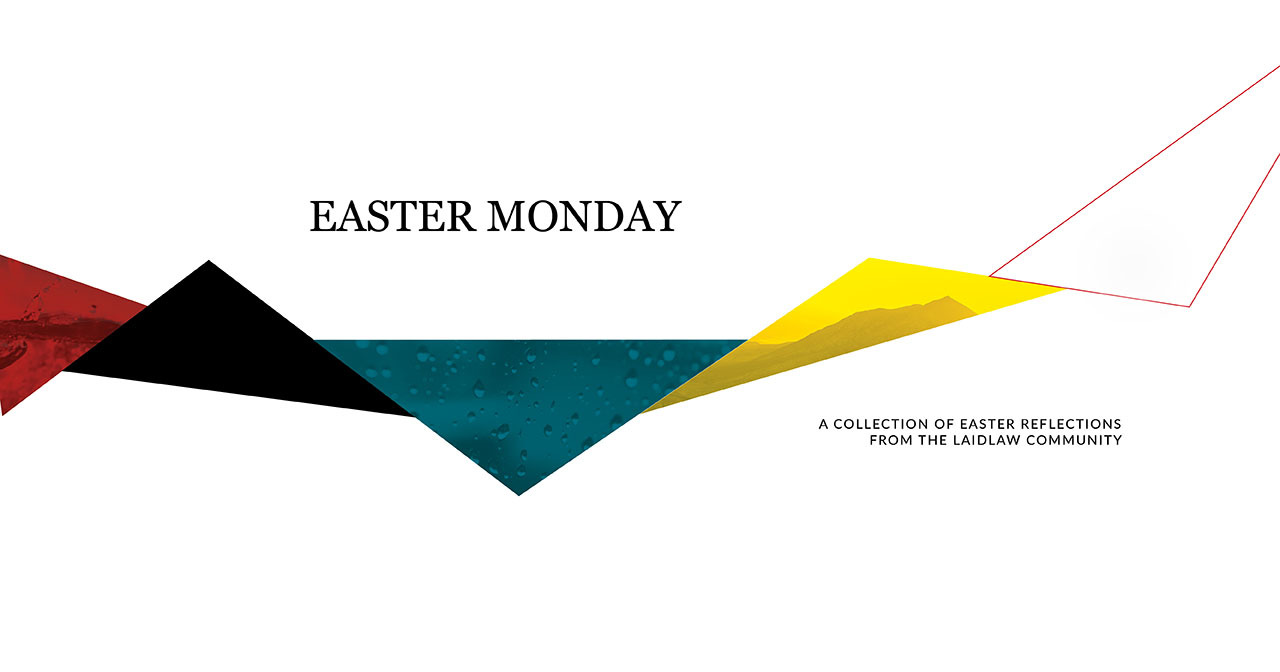
What Now?
As we reach the end of our Easter journey, we might ask: what do we do now? How should we live on the other side of Jesus’ death and resurrection? Here is how one disciple answered that question in John 21:3: “‘I’m going out to fish,’ Simon Peter told them.” It’s surprising, in light of Peter’s experience of meeting the risen Jesus, that we don’t find him in Jerusalem, preaching the gospel or confronting the Pharisees. Instead, we find him back in Galilee, back on his fishing boat, pulling in the nets. Peter has returned home and returned to what he knows—fishing. Jesus hasn’t even ascended to heaven yet, but Peter has already gone back to his old job.
This story shows us something of how the Easter events work themselves out in our lives. As the story progresses, the resurrected Jesus meets Peter in the midst of his trawling expedition, fills his nets with fish, and invites him to breakfast. Then, through his lakeside conversation with Jesus, Peter experiences renewal, restoration, reinstatement. This is resurrection life. It is not about us doing extraordinary things for Jesus. It is about Jesus, the crucified and risen one, encountering us in the ordinariness of every day.
Jesus meets Peter in his workplace and invites him to “bring some of the fish you have just caught” to the barbeque. That invitation is ours. Jesus meets us in our places of work, rest, study, recreation and family, and invites us to bring all that we have and do to him, that he might infuse it with his resurrected presence. Jesus extends grace to Peter by replacing his threefold betrayal with a threefold invitation to love. That grace is ours. All of our shame, blame and denial have been consumed by the cross and we now live in the spacious freedom of God’s forgiveness. Then Jesus reinstates Peter by calling him again to “follow me” (reminiscent of his first calling by the same lake). That calling to follow the risen Jesus is still ours today.
So what do we do now? We go back to our normal lives—the messy, the mundane, the seemingly mediocre. And we discover, if we are open to it, that the Risen One is waiting for us there.
Ps Reuben Munn, Professional Teaching Fellow, School of Theology
FOR LISTENING
